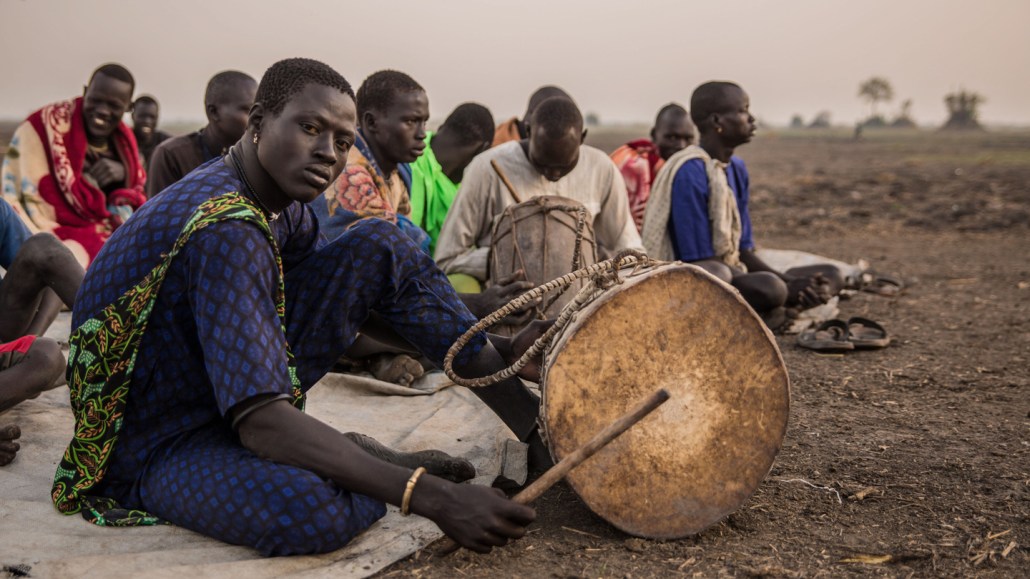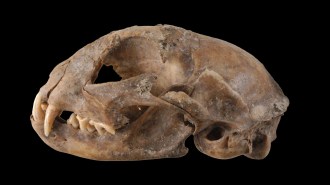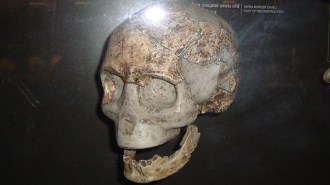
Three modern African groups, including Dinka people (some pictured), provided DNA that helped researchers identify a shift from long-distance to regional mating strategies across much of the continent about 20,000 years ago.
Stefanie Glinski/AFP via Getty Images
Ancient Africans in search of mates traded long-distance travels for regional connections starting about 20,000 years ago, an analysis of ancient and modern DNA suggests.
That shift occurred after treks across much of Africa to find breeding partners had been the norm starting at least 50,000 years ago, the same analysis shows. These new findings — helped by several examples of the oldest human DNA from Africa isolated to date — offer the first genetic support for a previously suspected change in mating patterns around that time.
These newly identified, long-distance movements of ancient human groups help explain archaeological discoveries of common types of stone and bone toolmaking and other cultural behaviors that increasingly appeared across much of Africa beginning about 50,000 years ago, evolutionary geneticist Mark Lipson of Harvard Medical School and colleagues report February 23 in Nature.
Starting around that time, inherited sets of gene variants became increasingly similar in ancient individuals found in central, eastern and southern regions of sub-Saharan Africa, the researchers report. This suggests that this area was a genetic melting pot, in which hunter-gatherers migrated between the three regions, mating with each other along the way.
Comparisons of ancient human DNA to that of present-day hunter-gatherers and herders in the same three parts of Africa indicate that people generally stopped traveling outside their home regions to find mating partners about 20,000 years ago, the team says. People may have stayed closer to home at least partly because the last ice age peaked around that time, reducing the number of areas harboring enough edible plants, animals and other resources needed to survive, says Yale University bioarchaeologist and study coauthor Jessica Thompson.
“As the African tropics came out of the last ice age, the landscape became full of many small groups of people with diverse local cultural traditions,” Thompson says. Culturally distinct groups tended to seek mates from neighboring groups with whom they had more in common than migrants from distant regions, she suspects.
African hunter-gatherers today still follow local cultural practices, speak in regionally distinct tongues and draw mates from nearby groups. Migrations of West African farmers to eastern and southern Africa starting about 2,000 years ago have largely erased ancient ancestry patterns in the DNA of present-day Africans. That makes ancient DNA crucial for unveiling those lost patterns.
In the new study, scientists extracted ancient DNA from the bones of six individuals previously excavated in eastern and south-central Africa. Estimates of when these people lived range from about 18,000 to 5,000 years ago. These new genetic data were studied along with already published DNA evidence for 28 African hunter-gatherers dating to as early as about 8,000 years ago. The researchers were able to retrieve additional DNA for 15 of those individuals.
A big boost to the new investigation came from the inclusion of several examples of the oldest known human DNA from Africa. Even older examples of DNA from Homo sapiens and closely related populations, including Neandertals from around 430,000 years ago (SN: 3/14/16), have been found in Europe and Asia where cold conditions preserve genetic material better than the African tropics do. Only H. sapiens is known to have inhabited Africa during the Stone Age stretch covered in the new study.
Calculations of the genetic variation in three present-day African groups — San hunter-gatherers from southern Africa, Mbuti hunter-gatherers from central Africa and Dinka herders and farmers from northeastern Africa — were used to estimate ancestry patterns reflected in each sample of ancient DNA.
Lipson and colleagues’ findings fit with previous ancient and modern African DNA studies suggesting that mating among widespread human groups began 200,000 years ago or more (SN: 1/22/20), says evolutionary geneticist Carina Schlebusch of the University of Uppsala in Sweden, who did not participate in the new study.
Hints of a “ghost” human population unknown from any fossils, but which contributed to the ancestry of ancient eastern Africans, also emerged in the new study, Thompson says. Many more ancient ghost groups once existed in different parts of Africa (SN: 2/12/20), she suspects.






